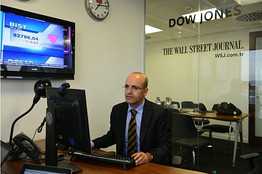By JOE PARKINSON
ISTANBUL—Turkey’s finance minister on Friday made the economic case for a rapprochement with Turkey’s Kurdish minority, saying it could free up billions in military spending and spur tax cuts for all Turks.
Mathias Depardon-The Wall Street Journal Türkiye

Finance Minister Mehmet Simsek said Turkey’s economy has started to pick up steam after a sharp slowdown in 2012.
Speaking with The Wall Street Journal in an interview conducted on social-networking site Twitter, Mehmet Simsek said that ending the three-decade conflict with the Kurdistan Workers’ Party, or PKK, would dramatically improve economic efficiency by closing loopholes in Turkey’s informal economy. It would also enrich Turkey’s middle classes, many of whom remain deeply skeptical about the monthslong peace process.
“Successful reconciliation means allocating $300 billion spent on fighting terrorism to education, infrastructure, R&D,” the minister tweeted in response to questions from Journal reporters, referring to one estimate of the total cost of the conflict to the economy. He said in a tweet that the reconciliation process would help efforts to fight money laundering and the shadow economy and may result in lower taxes.
Analysts said that the discussion of possible tax cuts signaled how Ankara was shifting its messaging on the dividends of peace to show wealthier Turkish voters they would also benefit significantly.
“This is the first time we get to hear about a reassessment of direct taxes. If there is a move to cut income taxes it would be a measure that would cater to the Turks,” said Sinan Ulgen, a former Turkish diplomat now at the Carnegie Endowment for International Peace.
“So far the government has been very hesitant in explaining what the economic impact of this settlement plan should be, but now they’re talking in more specific terms what that peace dividend would be and how that would improve economic conditions of Turks and Turkish businesses in particular,” he said.
Since the peace negotiations began at the turn of the year, Turkey has hoped a peace deal would alter the power dynamics in a region of the world being reshaped by uprisings and a reduced U.S. military presence, and further Ankara’s aspiration to be a model for nascent Muslim democracies emerging from the Arab Spring.
But the comments come as the jubilant mood which met Kurdish militants’ February call to lay down arms has in recent weeks been replaced by a more complex reality: an uncertainty over which party should take the next step in the peace process, and what that step should be.
The leadership of the militant Kurdistan Workers’ Party has demanded that Turkey’s parliament pass laws to ensure the safety of their fighters during withdrawal, and to avoid the recurrence of the bloodbath in 1999, when Turkish soldiers attacked PKK fighters as they emerged from hide-outs in Turkey to cross the Iraqi border after the capture of militant leader Abdullah Ocalan. Turkey’s Prime Minister Recep Tayyip Erdogan has thus far been reluctant to involve parliament in the process.
The finance minister, a former top banker at Merrill Lynch who returned to Turkey as a treasury minister in 2007, was born in Turkey’s predominantly Kurdish southeast and is well placed to understand how economic malaise has hampered the Kurdish regions over three decades of conflict and how economic potential could be unlocked by a settlement.
A 2009 per capita income survey estimated that annual income in the southeast is below $1,500—less than one-fifth of the $8,200 national figure. In the broader southeast, half the population live in poverty and 15% to 20% are unemployed, according to a report by the International Crisis Group. Young men are forced to go to western Turkey for seasonal jobs four to five months at a time, and Diyarbakir, the biggest city in the southeast, relies heavily on their remittances.
Businesses in the southeast—conscious of how a deal could offer a windfall in investment—have strongly backed the peace talks, but many Turkish businesses across other parts of the country have been more circumspect, after a series of previous bids have collapsed and sparked further violence.
Beyond the potential financial benefits of peace, Mr. Simsek stressed that Turkey’s economy in recent months has started to pick up steam after a sharp slowdown in growth in 2012 following two years of expansion which rivaled China. Turkey can expect a fourfold increase in privatization revenue 22 billion liras ($12.2 billion) this year after the payments for projects long slated for sale finally reach the exchequer, he said.
via Turkish Minister Makes Economic Case for Peace With Kurds – WSJ.com.

Leave a Reply